How To Make Shoes With Bad Shoe Making Supplies
How to make shoes that are comfortable and beautiful when you have bad quality supplies?
How to make shoes when you can’t even find the supplies you need?
That is the most common problem that many beginners in shoe making have (not only beginners to be honest).
In this shoemaking post I will share with you 2 solutions that shoemakers use when they make shoes.
1. Alternative To Cork In Shoemaking
2. How To Make Shoes With Bad Leather
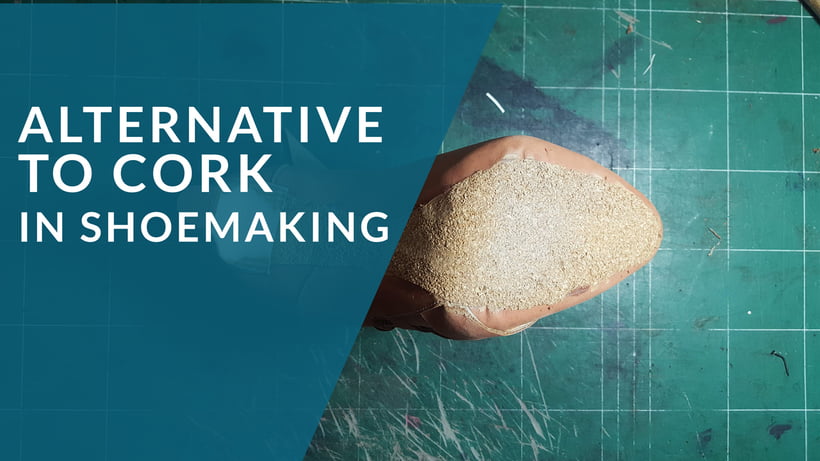
Cork is one of the shoe making materials you should use in making shoes. I already wrote about this amazing natural material in this post ‘’Cork in shoemaking’’ . Here you will learn where we use it in shoemaking.
One of the most common uses in making shoes that you as beginners must know is flattening of the shoe bottom.
Where do we need to use cork in shoemaking?
The fact is that to have beautiful and comfortable shoe sole you need to prepare the shoe bottom after lasting of the upper.
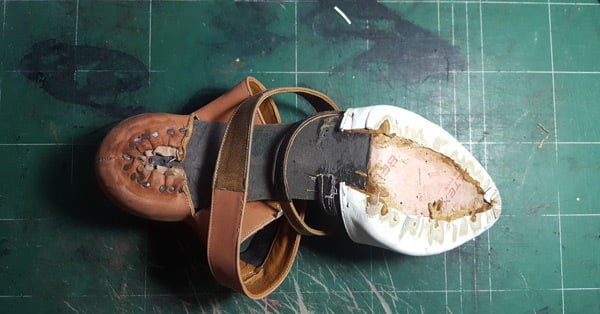
There is a gap on the insole between the lasted edge of the upper that you need to fill to have smooth, nice curved and flat shoe sole. The cork is the material that we use for this purpose in shoemaking to create smooth transactions between the lasted edge of the shoe upper.
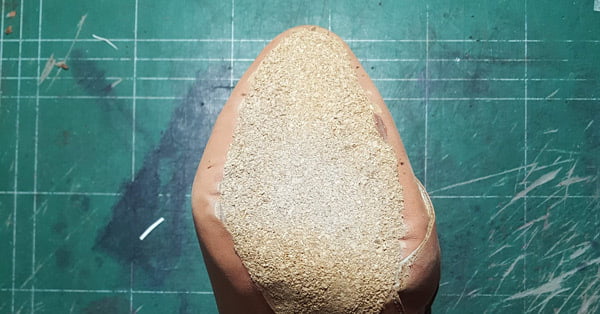
But what you can do if you can’t find this shoe making supplies?
There is an old shoemaking approach that you can use to make shoes, if you don’t have cork.
So let’s learn step by step how to make shoes when you have a lack of some shoe making supplies.
How to make shoes and prepare the shoe bottom without cork
Instead of sheets of cork you can use some old piece of leather. You can use some old leather coat or something else that you can find.
- Cut extra leather lasting allowance with a knife.
- You need to have smooth enough line of the upper and lining edge to insert the piece of leather.
- Make a pattern for this piece that you will insert between the edge of the upper instead of the cork.
- To the pattern use some transparent paper or masking tape. Place the paper on the insole and mark on it the line of the upper edge.
- Place the pattern on the inner side of the leather and cut it out.
- If you use masking tape, attach it to the cardboard, cut it out and then place it on the inner side of the leather.
- Put contact glue on the insole between the upper edges and on the outer side (face side) of the leather.
- To attach the face side of the leather to the insole scratch the surface with a knife.
- To insert this leather piece correctly in the gap between the upper edge attach it first to the toe, then to heel, and only then attach the middle part.
- Hit well with a hammer.
- To create smooth transactions between this piece and the lasted edge skive the edge of the leather piece if it extends.
- Sand the entire surface with shoemaking rasp to have the smooth surface ready for the next step when you will start making the shoe sole.
How to make beautiful shoes that the only leather you can buy is a thick, too soft, bad quality leather that mostly uses in furniture?
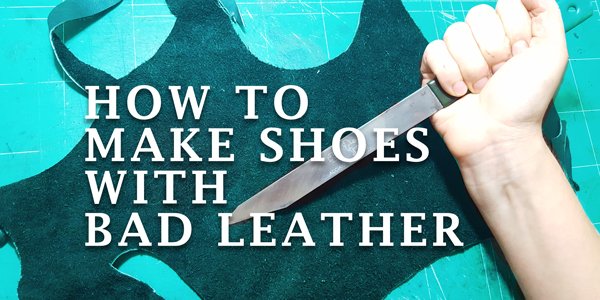
If you will persist and work with this leather as it is, the shoes that you will make will have an ugly do it yourself look, but I’m sure you don’t want.
Now, how you can make shoes if that is the only solution you have.
In this post, I will show you a simple solution on how you can make shoes with not ‘’the best’’ materials for shoemaking.
Remember, this is not the typical approach to make quality shoes.
But if you are a beginner in shoemaking and you just wonder if shoemaking is for you or you want to learn how to make shoes, but you don’t want to spend too much money right at the beginning ( you can’t source quality materials for shoemaking), let’s see what I have for you.
Shoemaking Suppliers Solutions
My approach on how to make shoes is the simplicity that is based on knowledge.
If you are a beginner in shoemaking you don’t have to own all the tools and all the best quality materials to make shoes because that has no guarantee to make beautiful and comfortable shoes.
If you never skived or never sew the shoe upper, great quality sewing machine or top quality leather won’t help you.
What you need instead is to focus on your knowledge in making shoes and skills.
In my online shoemaking courses, first and most importantly, my students learn and gain the knowledge, skills, and understanding how to apply everything in shoemaking craft, and everything else is simple shoemaking creativity.
The best way to buy heels is to buy them together with the shoe last because of the simple fact that the wedge and the seat heel must match the wedge of the shoe last.
But what do you do if you buy them separately?
The heels that you will get won’t match the shoe lats so you will need to adjust them.
Plastic heel
If it is plastic heel change the wedge angle by sending it and then cover the heel with leather or fabric.
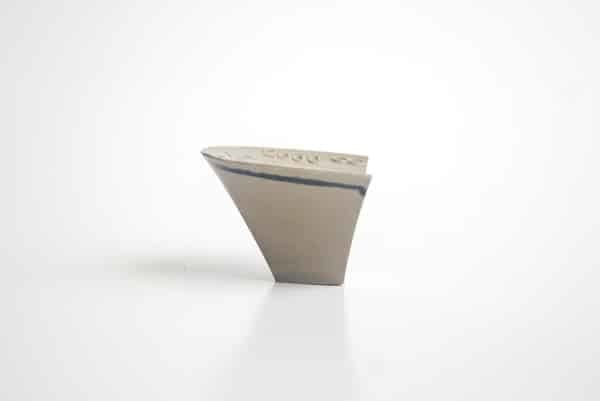
Low wedge heel
Combine from bespoke shoemaking approach, we will add a vegetable leather layer
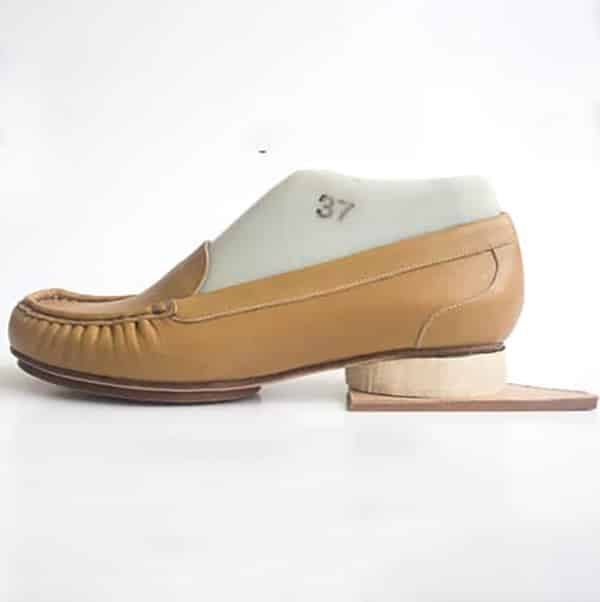
This is a mocassin from my ”How to make Mocassins course” with a wooden heel that I teach how to build in the course. So this is another option you have when you can’t find proper heels for your shoes: make heels by yourself.
3 important shoemaking materials, components in making a shoe are upper leather, cardboards for insoles and cork.
These are basic materials in shoemaking but if you are a beginner (not only) you will know that sometimes it is difficult to source them in a small quantity but should this problem stop you from making shoes?
No way! Right now I will show you step by step solutions on how to make shoes using leather for upper that has bad quality, a leather that is too soft!
Now you can learn one of the useful shoemaking techniques on How to use ‘’bad’’ leather in making of shoes?-step by step
How To Make Shoes With BAD Leather
Time needed: 35 minutes
How to make shoes if you have ‘’bad’’ leather for the shoe upper?
Step by step tutorial on how to improve too soft upper leather to make shoes
- Cut the upper part of your shoe from the leather you have
There is a professional shoemaking approach to cut leather and in this post ‘’How to Cut Leather for Shoes Correctly?!’’ you can learn it.

- Skive the shoe upper in the places where you need to.
There is a shoemaking approach on how to skive leather with shoemaking knife. If you still don’t know how to skive learn it in this post ‘’How to Skive Leather in Shoemaking?!’’

- Make a pattern of reinforcement.
To use your too soft leather in shoemaking, you need to reinforce it. There is a special reinforcement material in shoemaking but you can do it by using simple denim fabric.
It must be thin and dense.
- To make this pattern of the reinforcement use the upper pattern.
In the place where you have folding reduce on 6 mm
In the place where you have the underline reduce on 4 mm
In lasting allowance reduce on 6 mm
- Cut your fabric
Place your new pattern, the pattern of the reinforcement, and place it on the fabric. You can cut it right away using the utility knife, exactly as you did with the leather upper.

- Put glue on the inner part of the leather upper and on the fabric
Use the same contact glue that you use usually in the making of shoes. Wait until the glue will dry.

- Attach them together
Be accurate and attach them precisely.

- Hit well with shoemaking hammer
If you don’t have the shoemaking hammer use the ordinary one.


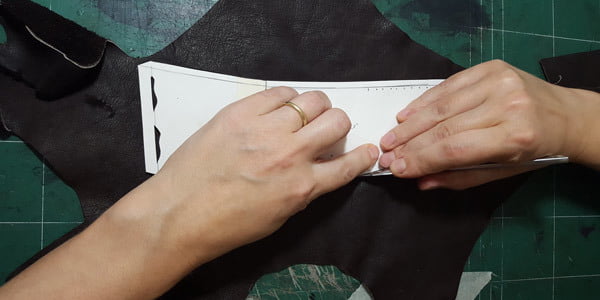
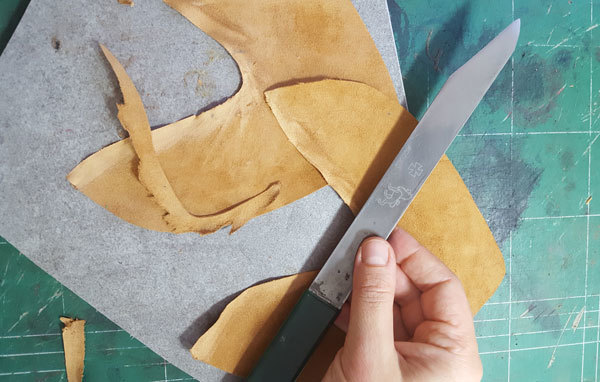
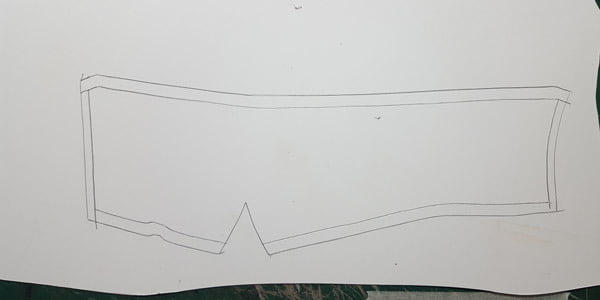
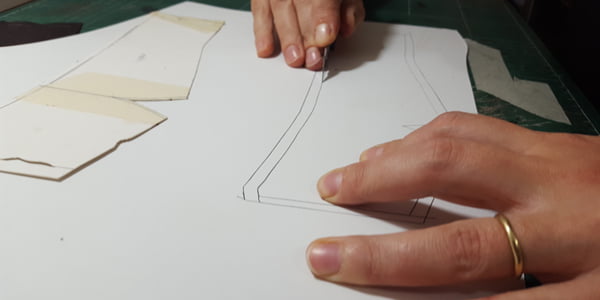

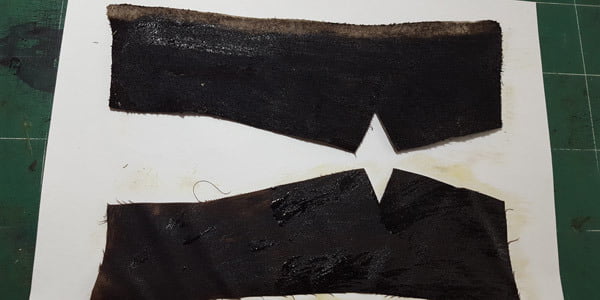
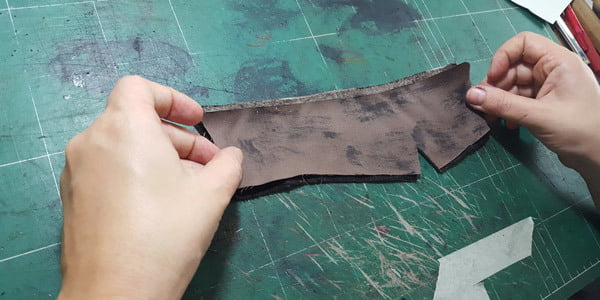
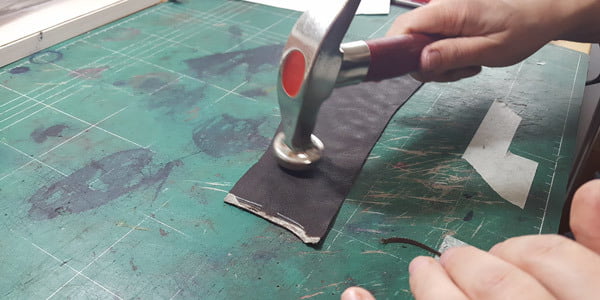
Hei, thanks for the update, it comes in the right moment I was thinking what to do.
However, you promised a link below that will lead to the full video, but I have not seen it.
Could you check it
Kind regards Vivian
The full step by step is in the post 🙂
To reinforce stretchy leather, does it need to be denim? Would linen work as well? Or even jute? Most denim I find is very stretchy, and I think it should have not a lot of stretch, right?